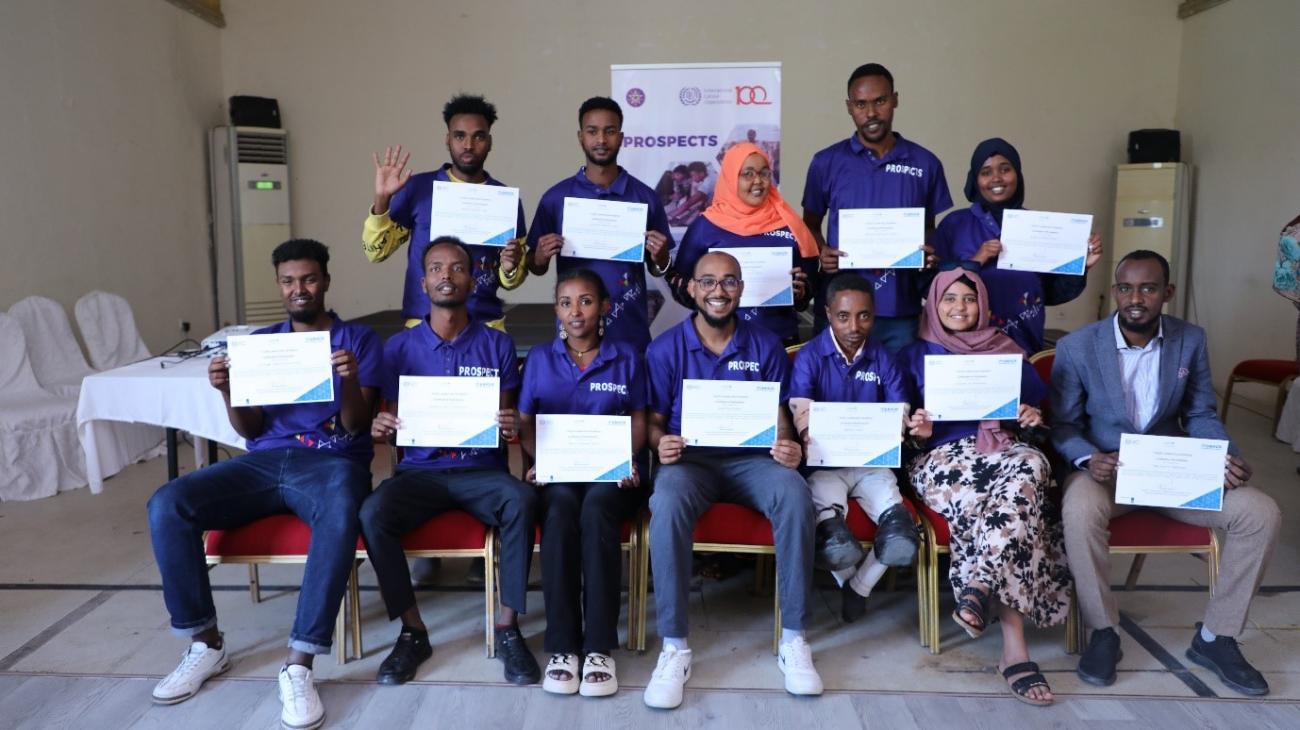Mentoring host and refugee youth in Ethiopia to become future leaders

Youth Leadership Academy was launched
The International Labour Organization (ILO), in collaboration with the United Nations High Commissioner for Refugees (UNHCR) and United Nations Children's Fund (UNICEF), organized a Youth Leadership Academy for members of the Youth Network Committee (YNC) in Dire Dawa, Ethiopia, in March 2023.
The YNC was formed in 2022 as part of a project entitled “Advancing young people’s engagement and meaningful participation in the PROSPECTS programme”. This academy provided a valuable opportunity to YNC members to gain knowledge and skills to fulfil their advisory role to the project and become organizers, advocators and leaders in their communities.
Launch of the Youth Leadership Academy
The opening ceremony of the Academy included representatives from the Ministry of Women and Social Affairs, the Embassy of the Netherlands in Ethiopia, the Confederation of Ethiopian Trade Unions, the Refugees and Returnees Service and the Ethiopian Centre for Disability and Development, along with officials of the three organizing agencies.
In her opening remarks, H.E Muna Ahmed, State Minister of the Ministry of Women and Social Affairs, said: “This Academy is an important forum for young people to be able to share their views and acquire employability and leadership skills. Together, these young minds can develop a collaborative strategy to address the challenges and to improve prospects of refugee and host communities.”
The State Minister also reiterated the government's commitment to support the project’s capacity-building activities.
In his address, Girmachew Zewdu, Senior Policy Officer of the Netherlands Embassy, highlighted the way in which the academy aligns with the Dutch government’s commitment to scale up international initiatives aimed at engaging young people in the economy and strengthening their voice through meaningful participation.
He said, “The involvement of young people in shaping and implementing policies that affect them is of a high importance for the Netherlands. This value is also reflected at the level of the Ministry of Foreign Affairs of the Netherlands which has set up a Youth Advisory Committee to advise the Ministry on execution of policies that are relevant to young people.”
Reminding participants that young people from refugee, internally displaced and host communities have historically been left out of decision-making processes, Jean-Yves Barba, Chief Technical Advisor of ILO PROSPECTS Ethiopia, said: “These young people should have a say and be meaningfully engaged in interventions and programmes that affect them directly. The immense talent, resilience and inherent leadership capacity that youth in forced displacement contexts bring with them is indisputable.”
The youth engagement project aims to maximize synergies and leverage comparative advantages of development and humanitarian agencies to enhance the impact of interventions targeting refugee and host communities. Milagros Lazo Castro, ILO Global Coordinator for the Meaningful Youth Engagement Project, said: “This Academy sets a perfect example in this regard bringing together the technical expertise, skills and resources of the ILO, UNHCR and UNICEF to nurture leadership skills of young people from host and refugee communities.”
Broad-based training programme
The first day of the academy started with reflections around the role of young leaders in their communities. Members of the YNC shared their leadership journey, including the additional challenges and opportunities faced by forcibly displaced youth.
Representatives of the Ministry of Women and Social Affairs, the Bureau of Youth and Sport, the Bureau of Innovation and Technology and the Bureau of Skills and Jobs gave detailed presentations on their youth engagement work and proposed plan of action for the inclusion of forcibly displaced youth in their respective office priorities. In addition, representatives of the Refugees and Returnees Service and the Confederation of Ethiopian Trade Unions presented national policy, legislative and regulatory frameworks on the right to work and rights at work of young people in forced displacement contexts, including freedom of association.
Further elements of the training programme included communications and advocacy, promoting peaceful coexistence, mediation and conflict resolution, leadership and gender and disability mainstreaming in community work. The final day of the training wrapped up with summarization of weeklong dynamic discussions and inspiring insights.
Way forward
One of the key outcomes of the workshop was the development of a joint work plan on mainstreaming gender and disability sensitive approaches in the ongoing project activities.
“I personally had limited knowledge, especially on gender mainstreaming, disability inclusion and advocacy. This training has helped me develop important insights. All the participants felt heard and learned a lot and now we are keen to apply this learning in our community work,” said Sileshi Umer, Vice Chairperson of the YNC.
Marta Mamuye, a member of the YNC, explained: “We are here representing the youth of both refugee and host communities who need better opportunities. Our goal is to find solutions to make their lives better. This training will help us to address some of the challenges we might face in handling our assignments.”
In expressing the gratitude of the YNC members to the organizers, Hudeyfe Abdirashid, Vice Chairperson of the YNC, said: “The academy gave us a chance to learn from each other and understand each other better, keeping in mind that there are young people in the committee from different communities, including refugees and young persons with disabilities. As a result, we will be more mindful about adopting more inclusive approach in the future interventions we will plan in our communities.”
Written by Zelalem A. Desta



